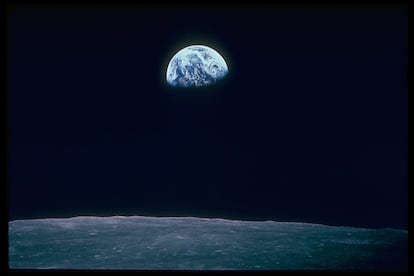A life without purpose
Attributing a goal in life to living beings and to other people is surely a useful way to navigate the world, but that does not mean that it is the right thing to do

In the kind of surveys that explore the greatest concerns of citizens, teleology never shows up. It makes sense, since no one has heard of it, but the truth is that teleology constitutes one of the biggest problems of our time. It is the common theme underlying creationism, conspiracy theories and, by extension, much of the irrationality that circulates in spurts through social, or antisocial, networks. Teleology, from the Greek telos (end), entails explaining things by their purpose, their goal, their ultimate end, believing that our life is endowed with a project, and that this holds for life as a whole, that everything that happens is part of a higher plan that we do not understand, but that we preach as a revealed truth.
The easy thing to do would be to blame all this on Aristotle, who distinguished between efficient causes—those that trigger something—and final causes—those that are directed toward a goal. If you walk to a bakery, the efficient cause is that you are moving your legs, and the final cause is that you want to eat a loaf of bread and half a dozen muffins. We humans always like to believe we are doing things for a reason, guided by a purpose, even when we suspect that deep down this is not the case. Does that second beer have a purpose? Is there a meaning in giving vent to your anger, insulting people on X, ignoring an argument for the simple reason that it doesn’t fit in with your prejudices? Oh, come on.
Let’s not take it up with Aristotle either, for the man had enough with the massive failure of his gravitational theory, which Galileo had to refute 15 centuries later. When it comes to the subject of the ultimate cause, the poor Greek thinker did nothing more than encode one of the greatest automatic thought patterns with which we are burdened at birth. We all carry teleology burned into our skulls. Giving purpose to living beings and to other people is surely a useful way to navigate the world, especially when you are being stalked by lions, snakes, lovers and the enemy army. But that does not mean that teleology, Aristotle’s final cause, is an accurate idea.
The psychologist Pascal Wagner-Egger and his colleagues at the universities of Freiburg, Rennes and Paris empirically examined the question a few years ago. Studying more than 2,000 volunteers, they showed that teleological thinking—explaining things by their purpose—not only underlies creationism, as might be expected after two millennia of Christian theology, but also conspiracy theories, the tendency to explain social, political, economic and historical events through a secret and perverse conspiracy.
Conspiracy theories also have something to do with religion, political affiliation, age, education and lack of analytical thinking, but their correlation with teleology is the most significant and robust. Wagner-Egger argues that teleology is a primitive form of thought, one that we carry in our heads “by default.” Attributing anything to the fact that God has created it, and any social or political phenomenon to a dark hand that governs our destinies from its luxurious hiding place, are two manifestations of the same style of teleological thinking, which seeks to reduce a complex world to a simple cause, like a Creator, a banker or a pharmaceutical laboratory. Better not to think at all than to think that kind of nonsense.
Does our life have a purpose? Since we are a product of evolution, and since evolution has none, the notion may be doubted. There are those who seek to achieve immortality through their work, but as Woody Allen said: “I don’t want to achieve immortality through my work; I want to achieve immortality through not dying.” These are bad times for Aristotle.
Sign up for our weekly newsletter to get more English-language news coverage from EL PAÍS USA Edition
Tu suscripción se está usando en otro dispositivo
¿Quieres añadir otro usuario a tu suscripción?
Si continúas leyendo en este dispositivo, no se podrá leer en el otro.
FlechaTu suscripción se está usando en otro dispositivo y solo puedes acceder a EL PAÍS desde un dispositivo a la vez.
Si quieres compartir tu cuenta, cambia tu suscripción a la modalidad Premium, así podrás añadir otro usuario. Cada uno accederá con su propia cuenta de email, lo que os permitirá personalizar vuestra experiencia en EL PAÍS.
¿Tienes una suscripción de empresa? Accede aquí para contratar más cuentas.
En el caso de no saber quién está usando tu cuenta, te recomendamos cambiar tu contraseña aquí.
Si decides continuar compartiendo tu cuenta, este mensaje se mostrará en tu dispositivo y en el de la otra persona que está usando tu cuenta de forma indefinida, afectando a tu experiencia de lectura. Puedes consultar aquí los términos y condiciones de la suscripción digital.









































